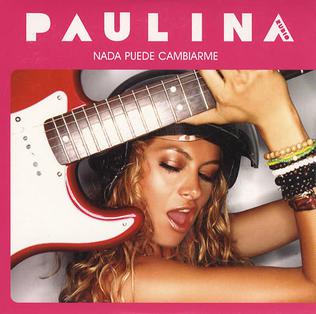Related Research Articles

Paulina Susana Rubio Dosamantes is a Mexican singer, songwriter and television personality. Referred to as "The Golden Girl" and "Queen of Latin Pop", she first achieved recognition as a member of the successful pop group Timbiriche from 1982 through 1991. After leaving Timbiriche, she embarked on a solo career. Rubio has sold over 15 million records, making her one of the best-selling Latin music artists of all time.

Ananda is the eighth studio album by Mexican singer-songwriter Paulina Rubio, released on September 18, 2006, through Universal Latino. Its pop rock music incorporates latin, dance, folk, electropop, alternative and flamenco styles with instrumentation from synthpop beats, guitars, drums, synthesizers, strings and Spanish musical instruments. Its themes range from love, empowerment, and dancing. Contributions to the album's production came from a wide range of producers, including Cachorro López, Rick Wake, Tricky Stewart, Áureo Baqueiro, TOY Hernández and Gustavo Santaolalla. Among the songwriters and artist collaborators appear on the album are Xabi San Martín from La Oreja de Van Gogh, Slash from Guns N' Roses, Juanes, Julieta Venegas and Coti.
"Ni Una Sola Palabra" is a song by Mexican singer Paulina Rubio from her eighth studio album Ananda (2006). It was released on July 23, 2006, by Universal Latino, as the lead single from the album. The song was written by Xabi San Martín, keyboardist of the Spanish pop band La Oreja de Van Gogh, and was intended to be included in one of the band's albums. Rubio took an interest in the song and recorded it in 2005 at her home studio in Miami, and it was produced by Cachorro López. Musically, "Ni Una Sola Palabra" is a pop rock song with elements from synth-pop, new wave and electronic.

Pau-Latina is the seventh studio album by Mexican singer Paulina Rubio, released on February 10, 2004, by Universal Latino. Musically, Rubio wanted to make a "futuristic folk" or a "cocktail of different music genres", thus incorporating eclectic latin music in its sound with instrumentation from techno beats, guitars, drums, synthesizers, strings and Spanish guitars musical instruments. Its themes range from love, dancing, friendship and feminist. Contributions to the album's production came from a wide range of producers, including Emilio Estefan, Chris Rodríguez, Toy Hernández, Marcello Acevedo and Sergio George.

Border Girl is the sixth studio album and first English-language album by Mexican recording singer Paulina Rubio. It was released on 18 June 2002 internationally by Universal Records and later launched in the Japan on August 21, 2002 by Umvd Labels. To her crossover into the English-language pop market, Rubio worked with writers and producers such as Kenny Flav, Lenio Purry, Doug Morris, Gen Rubin, Richard Marx, Brett James, Troy Verges, Michelle Bell, Jodi Marr and works again with Estefano, Chris Rodríguez and Marcello Acevedo. Its music incorporates genres of pop with influences of dance and pop rock, dived into elements of R&B, disco, ranchera, hip hop, house, and electronica. Its lyrics address the subjects of love, sexuality and self empowerment.

Paulina is the fifth studio album by Mexican singer Paulina Rubio. It was released on May 23, 2000 internationally by Universal Music México, being the first one with the label after departing from EMI México. Rubio worked with writers and producers such as Estéfano (mostly), Chris Rodríguez, Armando Manzanero, Juan Gabriel, Christian De Walden, and Richard Daniel Roman. The album explores a more variety sounds much different to the vein of her albums with EMI Music, and has an overall latin pop and dance-pop vibe, with influences from rock, ranchera, bolero, funk and house. Elaborating a "synthesis of the end of the millennium" theme for the album, Rubio reinvented her image.

24 Kilates is the second studio album by Mexican recording artist Paulina Rubio, released by EMI Capitol de México on November 16, 1993. Following the success of her debut album, Rubio reunited with the Spanish producer Miguel Blasco, who produced her second music project, while the songs were written mostly by Cesar Valle, Don Matamoros and C. Sánchez. The recording sessions took place in Spain during the summer of 1993, coinciding with Rubio promotion her first concert tour in South America.

La Chica Dorada is the debut solo studio album by Mexican singer Paulina Rubio, released on October 20, 1992, by EMI Capitol de México. The album was produced and directed by Miguel Blasco, and written mostly by José Ramón Flórez, Gian Pietro Felisatti and Cesar Valle. Most of the album's composition is primarily "a light and danceable pop", although it includes some elements of pop rock, new jack swing, new wave and a couple of ballads. The album's title has been stuck as Rubio's nickname throughout the Spanish-speaking world ever since.

"Nada Puede Cambiarme" is a song recorded by Mexican singer Paulina Rubio, features electric guitar by Guns N' Roses's Slash. It is the second track on Rubio's eighth studio album, Ananda (2006), which was written by Fernando Montesinos, with production from Áureo Baqueiro. The song was released as second single from Ananda on January 18, 2007 by Universal Latino.

"Algo Tienes" is a song recorded by Mexican singer Paulina Rubio for her seventh studio album, Pau-Latina (2004). Written and produced by Chris Rodríguez and Manny Benito, it is a pop and dance track containing a catchy "Pau! Pau!" hook. The song was released by Universal Latino as the second single from the album on May 17, 2004.
Gran City Pop is the ninth studio album by Mexican singer Paulina Rubio, released by Universal Latino on June 23, 2009. The pop album expanded the Rubio's stylistic palette by combining elements of genres such as rock, ranchera, hip-hop, eurodisco or arena rock, and she became more involved in songwriting and creative elaboration, extracting influences from various dance-pop-based genres including electropop, synth-pop and eighties British pop.

"Causa y Efecto" is a song performed by Mexican singer Paulina Rubio. The song was recorded for her ninth studio album Gran City Pop, and was released as the lead single on March 26, 2009. Causa y Efecto became a hit reaching number 1 in the U.S. Billboard Hot Latin Songs and Hot Latin Airplays. Causa y Efecto was produced by Cachorro López and written by Mario Domm and Mónica Vélez. "Causa y Efecto" is Rubio's first number one single in the Billboard Hot Latin Songs since Ni Una Sola Palabra in 2006. "Causa y Efecto" was awarded "Song of the year pop/ballad" by ASCAP.
"Ni Rosas Ni Juguetes" is a song recorded by Mexican recording artist Paulina Rubio for her ninth studio album Gran City Pop (2009). It was written by Claudia Brant, Noel Schajris and Gianmarco Zignago, and produced by Cachorro López. Due to popularity, the song was announced as the second single on July 20, 2009, released official worldwide on August 17, 2009 by Universal Music Latin Entertainment. "Ni Rosas Ni Juguetes" is a Latin pop song with ranchera and hip-hop influences. The song's lyrics discusses Rubio's decision to overcome a relationship and her empowerment.

"El Último Adiós" is a song recorded by Mexican singer Paulina Rubio for her fifth studio album Paulina (2000). It was released as the second single from the album on July 17, 2000 by Universal Latino. Rubio co-wrote and co-produced the track with Estéfano, and was originally conceived it as a ranchera-hip-hop-styled song. Lyrically, its a break-up mood.

"Mío" (English: "Mine") is a song recorded by Mexican singer Paulina Rubio for her debut solo studio album La Chica Dorada (1992). It was written by José Ramón Flórez and Cesar Valle and produced by Miguel Blasco and J.R. Florez. After recording and sending a demo tape, Rubio signed a multi-album deal with EMI Capitol de México in June 1992. "Mío" is a dance-pop song that refers to a girl's passionate feelings.

"Nieva, Nieva" is a song performed by the Mexican singer Paulina Rubio, written by Cesar Valle and C. Sánchez and produced by Miguel Blasco. The song was recorded in Madrid, Spain, through the promotion of Rubio's debut album, La Chica Dorada and the recording sessions for her second album. It was eventually released as the lead single from her second studio album 24 Kilates on September 29, 1993.

"Yo No Soy Esa Mujer" is a song recorded by Mexican singer Paulina Rubio for her fifth studio album, Paulina (2000). It was released as the fourth single from Paulina on April 2, 2001. After meeting with its writers Christian De Walden and Ralf Stemmann in Spain, Rubio recorded several versions of the song, including a Spanish version written by Carlos Toro Montoro. The pop rock-inspired song, produced by Marcello Azevedo, has self-empowerment lyrics.

Brava! (Brave!) is the tenth studio album and second bilingual album by Mexican recording artist Paulina Rubio, released on November 15, 2011 by Universal Music Latino. Two of its three singles "Me Gustas Tanto" and "Boys Will Be Boys" became hits for Rubio.

Deseo (Desire) is the eleventh studio album by Mexican recording artist Paulina Rubio, released on September 14, 2018 through Universal Music Spain, seven years after its predecessor Brava! (2011). Rubio worked with a multitude of producers and artist on the album, including Mauricio Rengifo, Andrés Torres, Juan Magán, The Julca Brothers, Toy "Selectah" Hernández, Morat, Joey Montana, Nacho, Xabier San Martin from La Oreja de Van Gogh, Alexis & Fido and DCS. It is a pop album characterized by Latin rhythms abound with urban sounds, and lyrical themes of love and female empowerment.

Mexican entertainer Paulina Rubio has released four video albums and has appeared in fifty-four music videos and three guest appearances. From her debut studio album La Chica Dorada (1992), she released music videos for the singles "Mío" and "Amor De Mujer", all directed by Ángel Flores and released from 1992–93. For the first of these, she earned an nomination ERES Award for Best Video. She followed with three other music videos from her second album 24 Kilates (1993): "Nieva, Nieva", "Él Me Engañó" and "Asunto De Dos", directed by Ángel Flores, Daniel Gruener and Tito Lara, respectively. Rubio's third studio album El Tiempo Es Oro (1995) spawned the singles "Te Daría Mi Vida" and "Nada De Ti", whose music videos was directed by Carlos Marcovich. This was followed by Planeta Paulina's videos: "Siempre Tuya Desde La Raíz", a futuristic video with a concept cosmic and 70's dance, "Solo Por Ti", recorded in a barren desert of Mexico, and "Enamorada", which tells the story of gay couple. The three videos was directed by Tito Lara from 1996-1997.